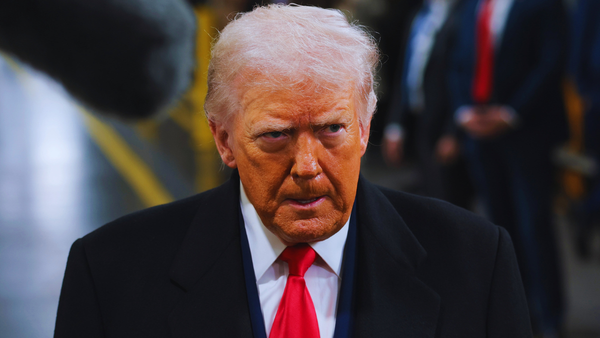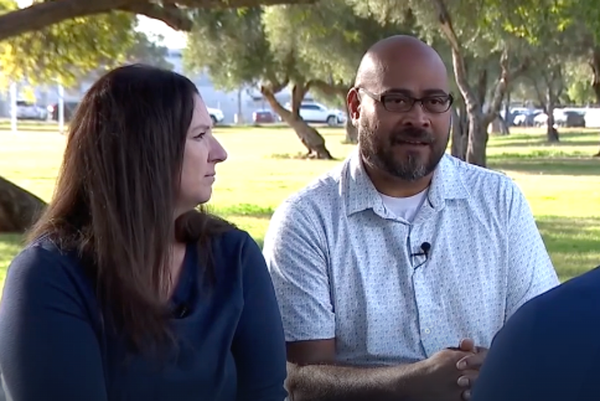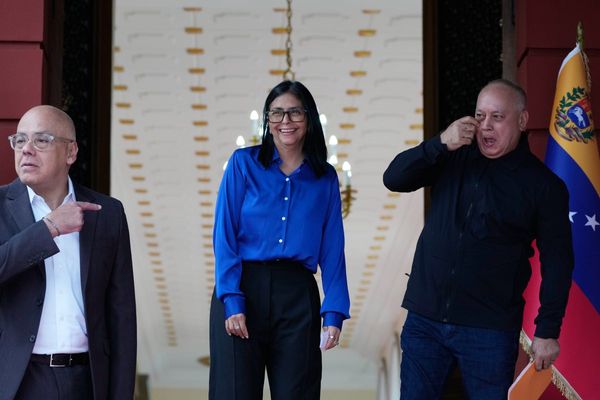For Walt Disney Co. Chief Executive Bob Chapek, the last few months have brought one headache after another.
Chapek navigated the company through an unprecedented pandemic that shuttered most of its business and oversaw the company's transformation into a streaming powerhouse.
But those accomplishments have largely been overshadowed in the eyes of Wall Street and Hollywood.
Since stepping into Bob Iger's Thor-sized shoes in February 2020, Chapek has suffered a series of public relations setbacks, including a feud with movie star Scarlett Johansson and a months-long showdown with Florida Gov. Ron DeSantis and right-wing media over gay and transgender issues.
It's not just bad publicity that has given Chapek grief. The problems are compounded by a flagging stock price and investors' doubts about his ability to hit his lofty goal of at least 230 million customers for streaming service Disney+ by 2024, especially after losing the rights to stream Indian Premier League cricket matches.
Those factors have led some industry insiders to question whether Chapek will survive at the top of the Burbank entertainment giant.
The corporate drama comes as Disney's board of directors gathers in Orlando for its annual retreat, where the 11-member body, of which Chapek is a member, thoroughly reviews the company's businesses and engages in deep dives on strategic questions.
The meeting, which begins Monday, is expected to culminate in the christening of the firm's newest cruise ship, the Disney Wish, with a Wednesday event at Cape Canaveral featuring costumed Disney characters and the Make-a-Wish Foundation. Chapek sits on the nonprofit organization's national board of directors.
While questions about leadership are sure to come up, the board meetings tend to be dominated by long, dry business presentations. CEO contracts are typically discussed in committee behind closed doors or remotely. Most people who spoke to The Times expect the board to re-up Chapek, if not at the meeting, then later this year.
A Disney spokeswoman declined to comment on board activities, and members of the board didn't respond to requests for comment.
Christine McCarthy, Disney's senior executive vice president and chief financial officer, praised Chapek's leadership in a statement provided to The Times.
"Bob Chapek stepped into his CEO role only two weeks before most of the company's businesses shutdown, and he deserves credit for leading the company through the unprecedented crisis of a global pandemic and emerging even stronger," McCarthy said. "His fact-based decision making has been focused on creating long-term value for the company and delivering results, and I could not be more happy with the great team Bob has created over the past few years. That, to me, is the sign of true leadership."
Disney Chairman Susan Arnold, in a statement earlier this month, signaled that Chapek had the board's backing and praised his "leadership and vision for the company's future."
Reversing that position would be embarrassing for the board, people familiar with the company said. Plus, there's no obvious internal candidate for the job, a significant factor for Disney, which tends to promote from within.
Still, Arnold's statement did little to stop wagging tongues in Hollywood, where some viewed a statement of support without a firm contract commitment as coming from a place of weakness.
The company issued Arnold's statement after Chapek abruptly fired Disney's top television executive, Peter Rice, a respected and sharp-elbowed executive whom some had speculated was a plausible successor to the CEO should the company need one.
The way Chapek dispatched Rice — in a meeting that lasted less than 10 minutes — was just the latest example of the chief's blunt manner. Rice's unambiguous ouster was somewhat rattling for the media business, where high-profile exits are often sugarcoated as voluntary resignations.
Rice, forged in the ruthless, siloed environment of Rupert Murdoch's 21st Century Fox entertainment empire that Disney acquired in 2019, was seen by Chapek as not being a team player, according to people close to the company. Rice was replaced by his deputy, fellow Fox alum Dana Walden, whom Chapek viewed as a better fit for Disney's collaborative structure and corporate culture.
The uncertainty surrounding Disney has weighed on the company's stock, despite the continued growth of subscriptions at Disney+ (recently reaching 138 million), strong theme park attendance and the $945-million box office success of "Doctor Strange in the Multiverse of Madness." Disney shares have fallen 37% so far this year, while the S&P 500 has declined about 20%. The stock closed Friday at $97.78.
"From an operating standpoint, they're doing really well, but there's just been a series of faux pas at the company, and a lot of it could have been avoided," said Jessica Reif Ehrlich, senior media and entertainment analyst at Bank of America. "This has been probably the most dramatic and difficult CEO transition that I've ever seen in my career."
Chapek took over the CEO job at the worst possible time. Just weeks after he replaced Iger, the coronavirus shut down theme parks, movie theaters, cruise ships, Broadway plays and live sports — the bulk of Disney's business.
Adding to the challenges, Chapek had to operate in the shadow of Iger, a revered and charismatic figure who would still serve as executive chairman for two years after giving up the CEO role.
An Indiana native and Disney veteran, Chapek came to the CEO job with a different skill set and demeanor from Iger's. Whereas Iger would establish a reputation as a visionary with a facility for dealing with creative talent, Chapek came up through businesses such as home video and consumer products, which are more about monetizing content than creating it.
"They're very different men with a very different style, and they come from a very different life experience," said Jim Shull, a former Disney Imagineer.
While well-liked by many film and TV producers, Chapek has struggled to ingratiate himself in an industry of fragile egos. In an early stumble, in response to a lawsuit from Johansson over box office bonuses for "Black Widow," the company effectively chastised the Marvel star as greedy and insensitive to the pandemic and disclosed her $20 million salary. The two sides settled confidentially.
But that was nothing compared with the debacle in Florida, where Disney waffled in response to the Parental Rights in Education bill banning instruction on sexual orientation and gender identity in kindergarten through third grade.
Chapek's top PR executive, Geoff Morrell, who came to Disney from fossil fuel giant BP, advised Chapek to take a more backdoor approach to political advocacy, working behind the scenes with lawmakers to soften the bill, people familiar with the matter said. In an internal memo, Chapek told employees that making corporate statements would turn Disney into a "political football" and that the company could do more societal good through its movies and TV shows. The strategy backfired.
LGBTQ advocates and some Disney employees saw the bill as an attack on gay and trans youth and were furious with Disney for contributing to politicians who supported what they decried as "Don't Say Gay" legislation. The murder of George Floyd had further inspired staffers at media companies, including Disney, to advocate forcefully for social justice within their workplaces and demand that employers reflect their values.
By misjudging the brewing controversy in Florida and the emotions surrounding it, Chapek dove headfirst into a buzz saw of employee rage. Workers sent internal memos to leadership, while others spoke out publicly and planned walkouts.
Under mounting pressure, Chapek condemned the bill. That led to weeks of attacks from DeSantis, who blasted Disney as a "woke" corporation, and conservative commentators who accused Disney of indoctrinating kids with a "sexual agenda."
"Disney had a choice between going after this legislation as soon as it was produced or saying nothing," said Anthony Kreis, a law professor and political science expert at Georgia State University. "They tried to meet everybody halfway, and that was just an untenable position."
In the aftermath, Chapek created an LGBTQ task force and embarked on a listening tour with various Disney departments to rebuild trust with employees. Morrell resigned after just three months in the job, replaced by Kristina Schake, who previously led President Biden's COVID-19 vaccine campaign.
Nonetheless, the ripple effects have continued. DeSantis signed a bill that would eliminate Disney's special self-governing status in an area of Central Florida that encompasses Walt Disney World Resort, known as the Reedy Creek Improvement District.
Social conservatives bashed the "Toy Story" spinoff "Lightyear" because of a scene where two characters of the same sex briefly kiss.
The movie opened to disappointing box office sales, though it's unclear how much the backlash affected its performance. Analysts said the struggles were more due to lukewarm audience reception and a confusing premise and marketing campaign. The kiss had been cut from "Lightyear," but was restored after employees complained of the company censoring "overtly gay affection."
This month, Disney delayed until 2026 a plan to move 2,000 jobs from departments including Imagineering and consumer products to Central Florida, citing a construction delay, though some affected people had already moved or made plans to do so. Disney denied that the three-year delay was related to DeSantis.
Despite the slumping stock, the company's performance has been strong coming out of the pandemic doldrums. Robust attendance for Disney's theme parks helped to generate $6.65 billion in revenue from its parks, experiences and products division in the most recent quarter, more than doubling sales from a year ago.
Disney+ added 8 million subscribers last quarter, despite fears of a broader slowdown in streaming after Netflix posted its first subscriber loss in more than a decade.
The company has had a number of hits on Disney+ including Marvel Studios' "Loki" and the "Star Wars" series "Obi-Wan Kenobi." Disney-owned Hulu has also garnered attention with programming like "The Dropout" and "Dopesick." Disney is introducing a cheaper version of Disney+ with advertising in order to attract more subscribers. The company is also adding a broader array of programming to Disney+, including moving "Dancing With the Stars" from ABC to the streamer this fall.
"It feels that Disney has a clear path forward for what they need to do, and Chapek is an execution guy, so he might actually be the right person if you can get over the missteps with the Florida stuff," said Paul Hardart, director of the entertainment, media and technology program at NYU's Stern School of Business.
Disney+ still has a long way to go to reach its goal of 230 million to 260 million subscribers by the end of fiscal 2024. Though Disney executives have said the company is on track to hit its targets, some analysts expect the company to lower its projections.
Losing the streaming rights to IPL cricket games could be a hurdle for Disney+ reaching its goals, analysts said. Instead of securing digital and linear rights for the matches, Disney paid roughly $3 billion for the ability to broadcast them on traditional television channels for five years.
Some analysts questioned the decision. Cricket is a significant driver of the company's Disney+ Hotstar service in India, which accounts for more than a third of Disney+ subscriptions. One report estimated that the loss of IPL could cause 15 million customers to leave the service.
But dropping IPL streaming may have been a financially prudent decision, as the digital rights would have cost an additional $2.6 billion, analysts said. Instead, those rights went to Viacom18, a joint venture of Paramount Global and India's Reliance Industries. Though IPL cricket has buoyed Disney+'s numbers, those subscribers aren't worth much to the company. Disney+ Hotstar's average revenue per user was only 76 cents a month last quarter.
"While we applaud Disney for not spending an additional $2.63 billion, the Indian landscape has indeed become much more competitive than ever before," wrote analyst Michael Nathanson. "Perhaps this outcome will force Disney to rethink and pull back their long-term Disney+ subscriber estimates."
All of these are examples of how every decision Chapek makes is being dissected.
"Everything he does at this point is going to be put under a microscope, said Gene Del Vecchio, an adjunct professor at USC's Marshall School of Business. "It's a tough position to be in, but all of it is a result of his own doing."
____







